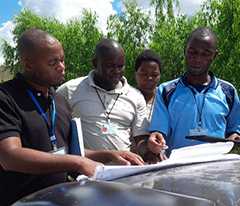Technology Yields Impressive Results in Malawi’s Population-Based HIV Impact Assessment

Tablet technology was a critical part of the Malawi Population-Based HIV Impact Assessment (MPHIA) project that conducted national, HIV household-based surveys of adults, adolescents and children. Using 160 tablets, in three languages, the national data collection effort ran from November 2015 to August 2016. Trained survey staff used computer assisted personal interviews on android-based tablets to interview adults and children from approximately 15,000 randomly selected households with pre-programmed tablets and portable blood testing equipment. The use of the portable technology that automatically stored content reduced the amount of time required for data cleaning from six months for paper-based data to just one month for the tablets. This boost in efficiency enabled the teams to reach more people. In over 11,000 households, surveyors spoke to over 19,800 adults about HIV testing and whether or not they knew their HIV status. Participants who self-reported positive were asked whether or not they were currently taking antiretroviral medications. In addition, survey teams performed viral load testing on all participants who were found to be HIV positive. These survey efforts are now giving Malawi a national-level view of HIV incidence, pediatric HIV prevalence, viral load suppression, and use of services across its population to better help the country make critical progress towards achieving an AIDS-free generation.
The Malawi population-based HIV impact assessment was led by the Government of Malawi through the Ministry of Health, conducted with funding from the U.S. President’s Emergency Plan for AIDS Relief (PEPFAR) and technical assistance through the U.S. Centers for Disease Control and Prevention (CDC). The survey was implemented by ICAP at Columbia University in collaboration with local partners.
- Page last reviewed: June 28, 2017
- Page last updated: June 28, 2017
- Content source:


 ShareCompartir
ShareCompartir